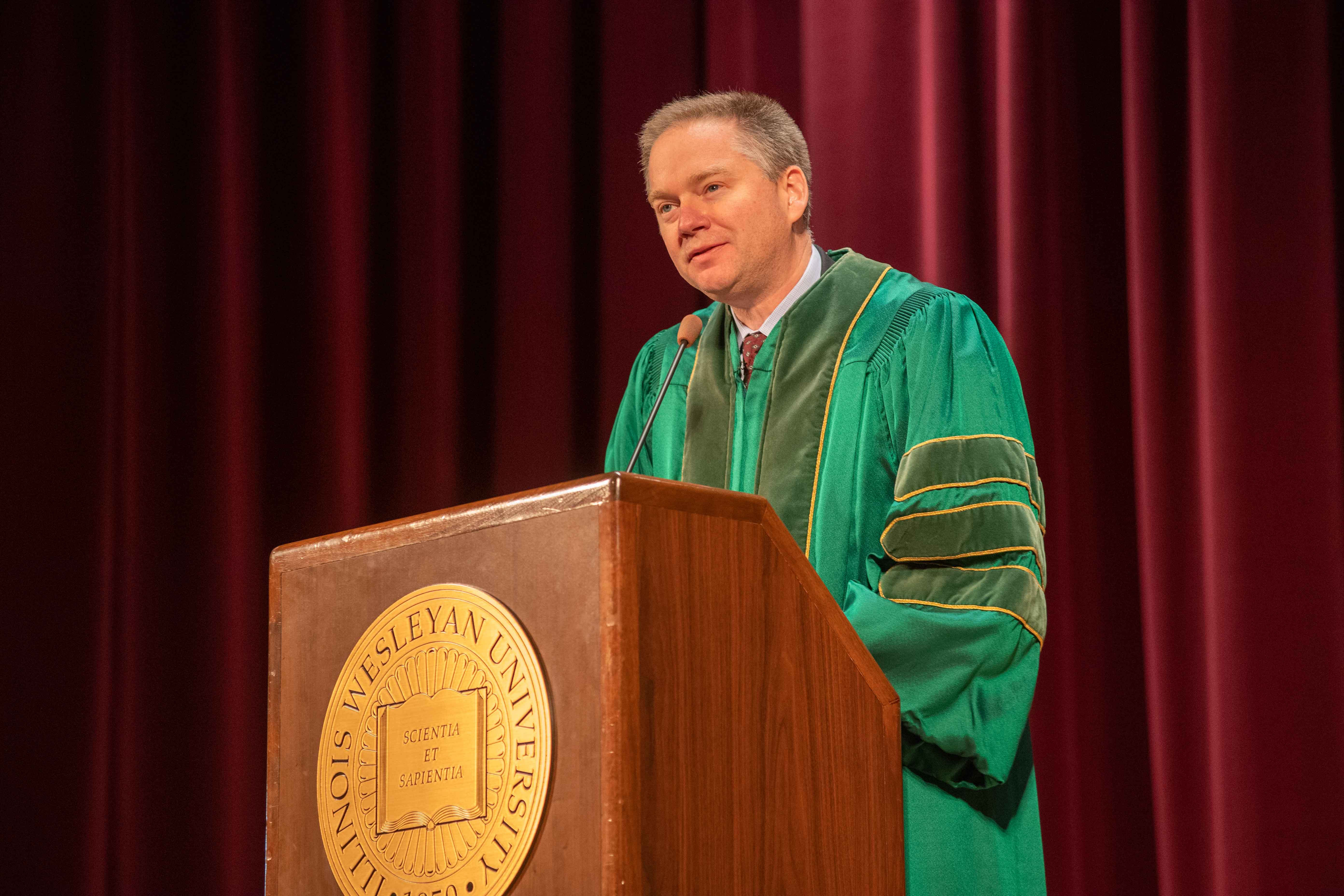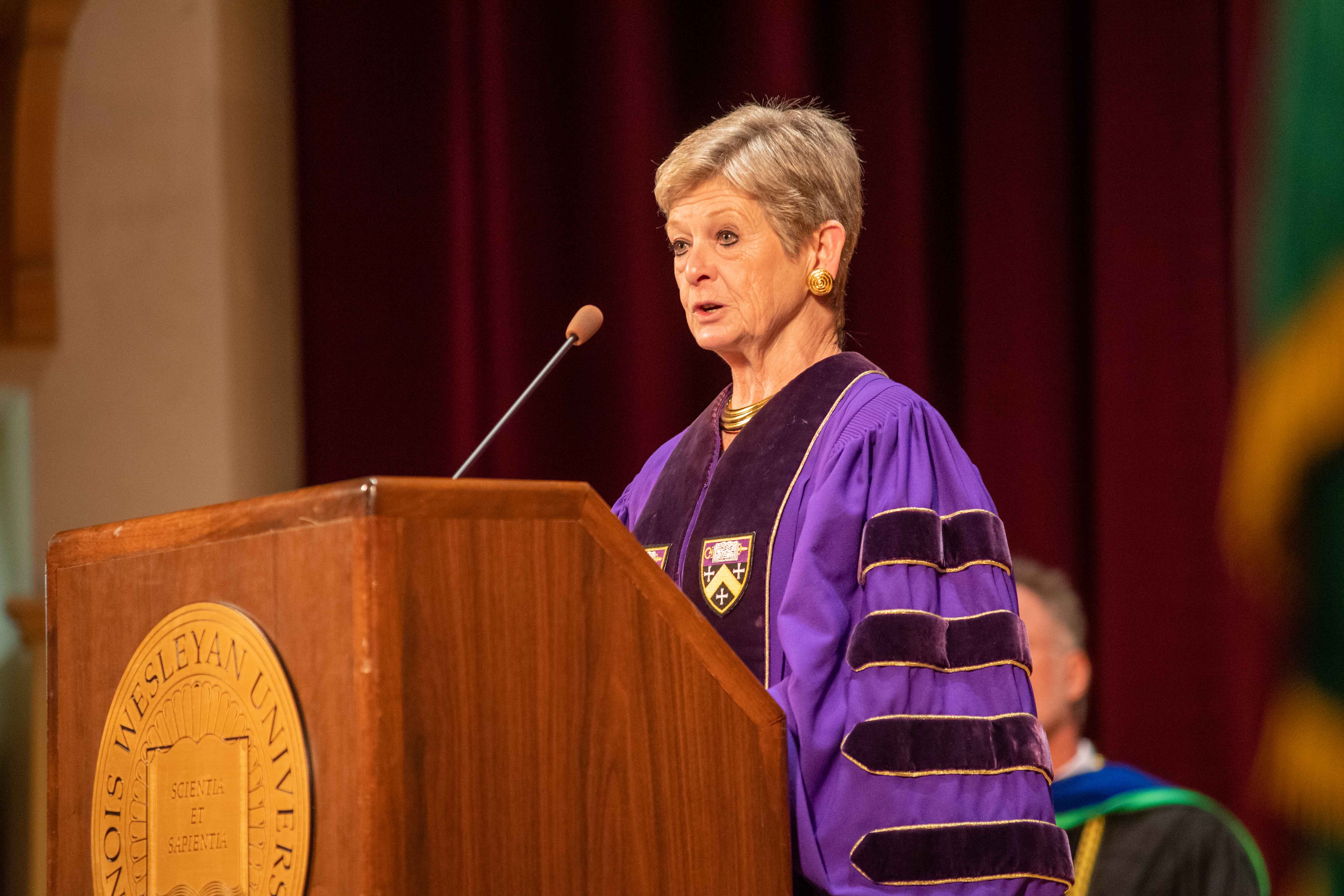Founders’ Day Keynote Addresses Fighting Fake News

Jan. 17, 2020
BLOOMINGTON, Ill. –– Whether they realize it or not, casual news readers are caught in the middle of a daily battle between the dissemination of credible information and disinformation. Real news versus fake news.
It’s a fight that Jim Kirk, the publisher and executive editor of Crain’s Chicago Business , said journalists must win. “There is no other alternative,” he told the audience gathered in Presser Hall’s Westbrook Auditorium for his keynote address at Illinois Wesleyan University’s Founders’ Day Convocation.
“The influx of fake news sites and so-called ‘content farms’ which pump out millions of fake stories, have done more damage to the trust readers have in news than anything we’ve seen in at least half a century,” Kirk said during his talk titled “The Future of Journalism in the Fake News Era,” which complemented Illinois Wesleyan’s annual theme “ Fact or Fiction .”
“As we head into another significant political year, there is no doubt that the same forces at work four years ago to seed disruption and fear into our system, are at work again to disrupt our political process,” Kirk continued. “Not necessarily to favor one candidate over another, but really to undermine our process by further polarizing our system by overloading it with content and messaging that is factually, just not true. A democracy at odds with itself is the goal.”
Kirk noted that amid the fake news phenomenon, traditional news outlets are facing an increasingly distrusting public. Transparency, Kirk said, will be key to journalists winning back this trust in a world saturated by misinformation.
“Reporters and editors will be expected to show more of their reporting than ever. And in many cases, it’s already happening.” Kirk said. “Most news organizations post documents to their stories to supplement their reporting. They need to do more of this. I would also argue that it will be more commonplace for news organizations to add background boxes to their stories –– a sort of ‘how did we report this' tutorial, explaining in great detail how they reported the story.”
Kirk said there is no shortage of people who want news. The New York Times has 4.9 million print and digital subscribers, its largest audience in history. However, to win the battle against fake news, Kirk said news organizations need to show the “thorough, dogged reporting” that exposes truths, and in some cases, saves people from harm such as Pulitzer Prize-winning investigative journalism conducted under Kirk’s leadership at the L.A. Times .
“I am convinced that if more readers could see the passion and dedication of reporters wanting to tell the truth on a daily basis, that would go a long way in separating real news and the influx of fake players out there,” Kirk said.
“At the end of the day, no one wants to be lied to. No one wants to feel that they’ve shared something that is inherently false,” Kirk concluded. “But as an industry, we need to come together and make it easy for our readers to see the difference. I’m bullish that this will happen.”

President S. Georgia Nugent opened Wednesday’s convocation by sharing the hopes of Illinois Wesleyan’s founders 170 years ago in the context of “Fact or Fiction.”
Nugent read from an 1851 advertising circular oozing of exuberant enthusiasm in search of prospective students: “We invite the young men of the city, and surrounding towns, villages and country to our institution of learning, where they may lay the foundations of greatness and goodness [and] prepare for a useful and happy career through life.”
Today, Americans who believe college education is “very important” is just 51% according to a recent Gallup poll, down from 70% as recently as 2013, Nugent told the audience.
“Now, this is a fact about the beliefs of those polled. But are those beliefs based on facts?” Nugent asked.
Nugent then referenced research by the Federal Reserve which shows that college graduates earn about $1.2 million more than non-graduates over the course of their lifetimes. Additionally, the median return on investment for a 4-year liberal arts college degree is nearly $200,000 higher than for graduates of all types of colleges, according to the Georgetown University Center on Education and the Workforce.
“This finding –– that liberal arts education offers a premium in earnings, as well as in other ways –– has been replicated in many different types of studies over many years. And that’s a fact,” Nugent said.
“As we proceed into the second half of our year of considering ‘Fact or Fiction,’ I would urge all of us to have the kind of courage of our convictions that our Founders had: that education matters, that the facts matter, and that the pursuit of truth and of the facts, however difficult it may sometimes be, is indeed the path to ‘a useful and happy career through life.’”
By John Twork